Previous workshops
Fall 2023
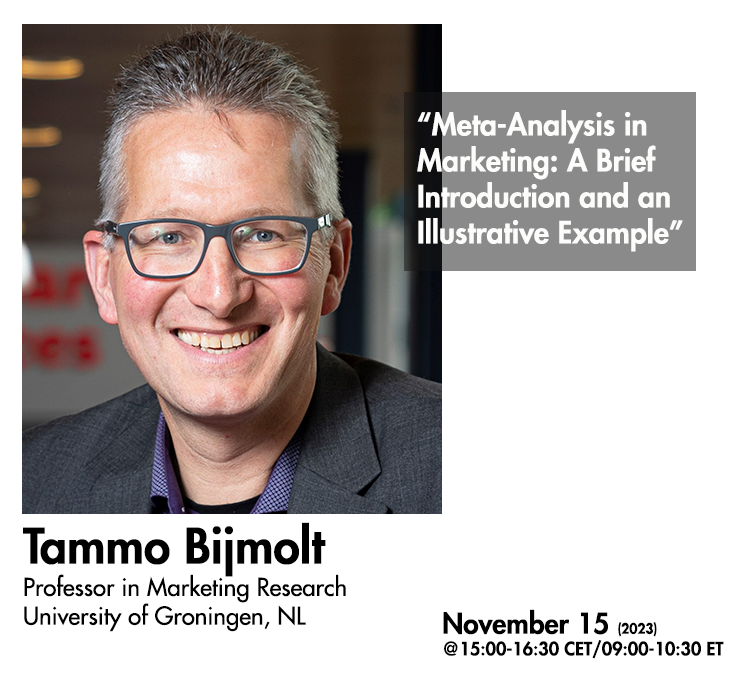
Speaker: Professor Tammo Bijmolt, University of Groningen
Date/Time: November 15, 2023. 15:00-16:30 CET/09:00-10:30 ET. Register ►here
Slides
Recording
Abstract
Typically, the relationship between specific marketing concepts has been studied empirically multiple times. Summarizing the existing empirical findings may result in an important scientific contribution. Meta-analysis encompasses a broad set of methods to conduct a systematic, quantitative review of the literature in order to derive empirical generalizations. As such, conducting a meta-analysis could be an excellent project for a PhD student or other (junior) researcher having to review the literature on a particular topic. I will discuss the process of conducting a meta-analysis from finding a topic, collecting and analyzing the effect sizes, to reporting the results. This will be illustrated using a recently published meta-analysis on brand extensions.
About the speaker
Tammo H.A. Bijmolt is Professor in Marketing Research at the University of Groningen, the Netherlands and director of the Groningen Digital Business Centre. His research interests include customer behavior, retailing, e-commerce, advertising, and meta-analysis. His publications have appeared in leading international journals, such as Journal of Marketing, Journal of Marketing Research, Marketing Science, Journal of Consumer Research, and International Journal of Research in Marketing. He is Associate editor of the International Journal of Research in Marketing, and member of the editorial boards of Journal of Marketing, Journal of Interactive Marketing, Journal of Retailing, and the International Journal of Electronic Commerce. He won the best paper award in 2007 and the J.B. Steenkamp long-term impact award in 2017 of the International Journal of Research in Marketing, the best paper award in 2011 and 2022 of the Journal of Interactive Marketing, and the best paper award in 2015 and 2017 of the European Journal of Marketing. He is president of the European Marketing Academy (EMAC) and has been board member of EIASM.
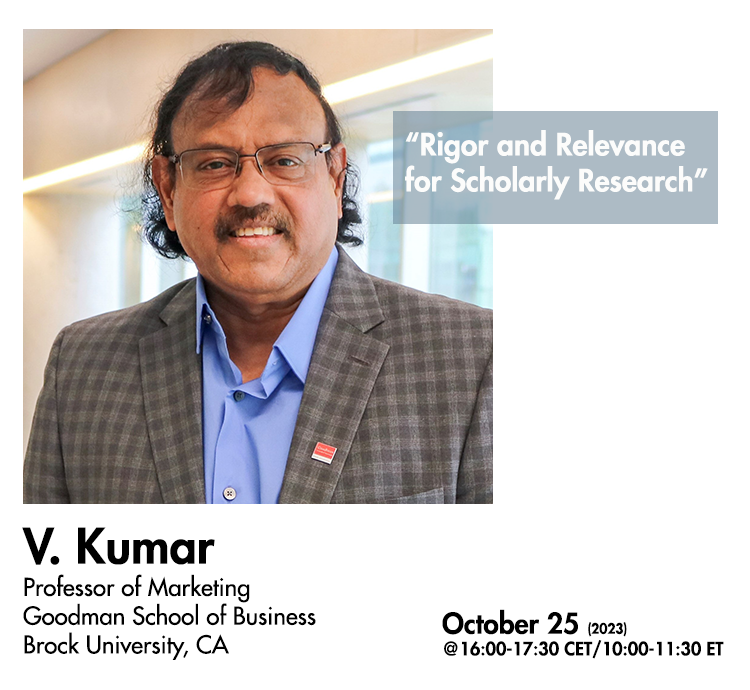
Speaker: Professor V. Kumar, Goodman School of Business, Brock University
Date/Time: October 25, 2023. 16:00-17:30 CET/10:00-11:30 ET. Register ►here
Abstract
This research seminar will focus on two aspects related to publishing -- Rigor and Relevance. The first part of the discussion will focus on the process of generating ideas that have the potential to result in a scholarly publication through implementing rigor and relevance. The second part will focus on how to avoid some of the common mistakes that authors make when crafting a manuscript. Specifically, the topics covered include the following: (1) Where to get the Ideas; (2) How to achieve both Rigor and Relevance; (3), How to get Firms' cooperation, if needed; (4) Identifying and Solving Key Business Challenges; (5) Speaking in Managers' Tongue; and (6) Understanding the process of the publications journey. Under each topic, several research studies will be discussed, some of which are recently published, and some are forthcoming.
About the speaker
Dr. V. Kumar (VK) is the Professor of Marketing, and the Goodman Academic-Industry Partnership Professor, Goodman School of Business, Brock University, ON, Canada. Prior to joining Brock, VK was the Salvatore Zizza Professor of Marketing, Tobin College of Business at St. John’s University, NY. He has held/holds several Distinguished Faculty Positions in the U.S., and Distinguished Fellowships across universities worldwide. VK has also been honored as a Legend in Marketing through the 10-Volume Legends in Marketing series published by Sage Publications with commentaries from scholars worldwide. Professor Kumar has published over 300 scholarly papers and 30 books, received over 20 Lifetime Achievement Awards, and over 25 Research and Teaching Excellence Awards. Professor Kumar has served as the Editor-in-Chief of the Journal of Marketing (2014-2018) and serves/served as the Department Editor of POM, and as the Consulting Editor of JIBS. Global Fortune 500 firms have implemented many of VK's ideas and models in multiple areas of marketing and operations which have resulted in gains of over multi-billion dollars. (URL: www.drvkumar.com and www.vkclv.com )
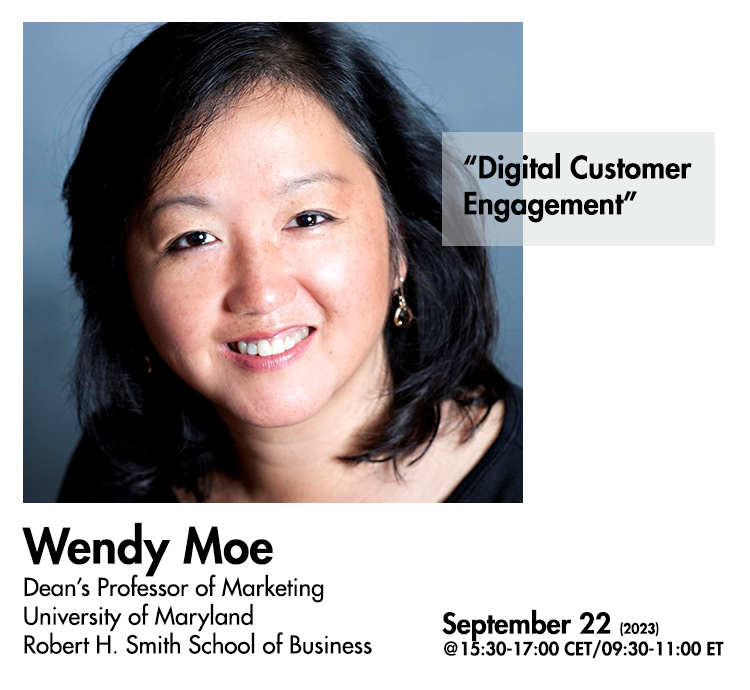
Speaker: Professor Wendy Moe, Robert H. Smith School of Business, University of Maryland
Date/Time: September 22, 2023. 15:30-17:00 CEST/ 9:30 – 11:00 ET. Register ►here
Download presentation
Abstract
From social media to streaming services to AI-enabled voice assistants, technology has provided new ways for brands to interact with their customers. The concept of “customer engagement” now includes a variety of new and previously unobservable interactions. Beyond just purchase loyalty and ad clickthrough, we observe customers sharing content with friends, binge consuming content, and dwelling on some content while skimming past others.
In this workshop, Professor Wendy Moe will provide an overview of how metrics and models of customer engagement have evolved. She will then discuss recent research that examines how certain linguistic features affect consumers' engagement with content.
About the speaker
Wendy Moe holds concurrent appointments as Dean's Professor of Marketing at the University of Maryland's Robert H. Smith School of Business and as an Amazon Scholar. Her research focuses on issues related to online consumer behavior, digital advertising, social media analytics, and customer engagement. With implications for how consumers engage with AI, Professor Moe develops models for large-scale data in an effort to quantify consumer behaviors and the effects of marketing interventions.
Professor Moe is a highly published academic with her research appearing in numerous leading business journals and is the author of Social Media Intelligence (Cambridge: 2014). Professor Moe has consulted for Fortune 500 corporations and government agencies in the areas of web analytics, social media insights, and product forecasting. Her research in web analytics was the foundation for NetConversions, Inc., an early innovator in the area of online data collection and analysis and was part of the founding team that brought the company from start-up to acquisition in 2004. She has also served as an expert witness in litigation related to online consumer behavior, data tracking and analytics, and online marketing and advertising.
Professor Moe holds a PhD, MA and BS from the Wharton School at the University of Pennsylvania and an MBA from Georgetown University.
Spring 2023
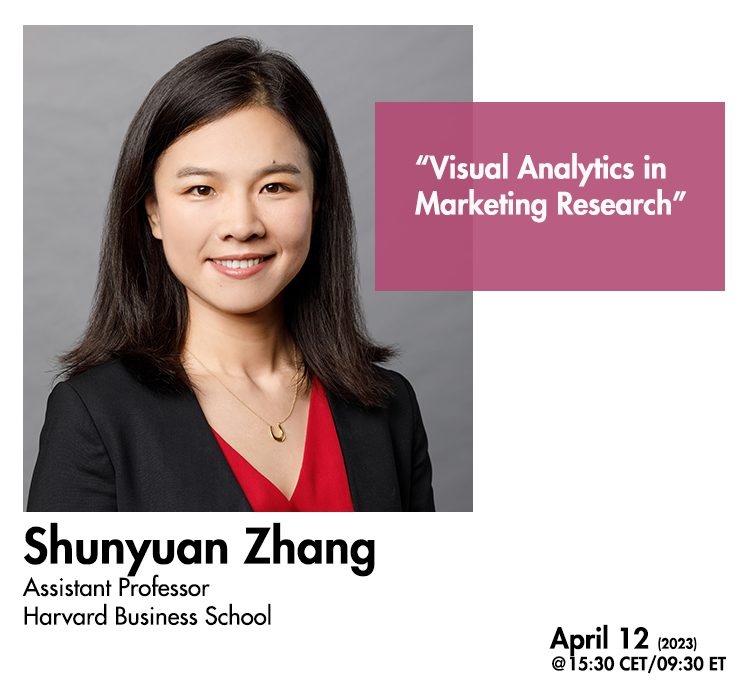
Speaker: Shunyuan Zhang, Harvard Business School
Title: Visual Analytics in Marketing Research
Date/Time: April 12, 2023 @15:30 CET/09:30 ET. Register ►here
Abstract
The growth of social media and the sharing economy is generating abundant unstructured image and video data. Computer vision techniques can derive rich insights from unstructured data and can inform recommendations for increasing profits and consumer utility. An emerging stream of research has focused on understanding how machine learning models explore complex, non-linear underlying structures and transform what they “see” into high-dimensional vectors, which may provide useful insights that cannot be detected by the human eye. We use a few recent papers as an example to discuss the opportunities and challenges in using visual analytics for marketing research and how one might approach it differently.
About the speaker
Shunyuan Zhang is an Assistant Professor in the Marketing unit at Harvard Business School. She teaches the first-year Marketing course in the MBA required curriculum. Shunyuan studies the sharing economy and the marketing problems that the dynamics of this new economy present. She deploys machine learning methods including deep learning to extract useful information from unstructured data. Combining this information with structured data, Shunyuan conducts thorough analysis and policy simulations to examine important issues emerging in the sharing economy arena. Shunyuan earned a Ph.D. in Marketing/Business Technology from Carnegie Mellon University, Tepper School of Business. She has a B.S. in Physics from the University of Science and Technology of China.
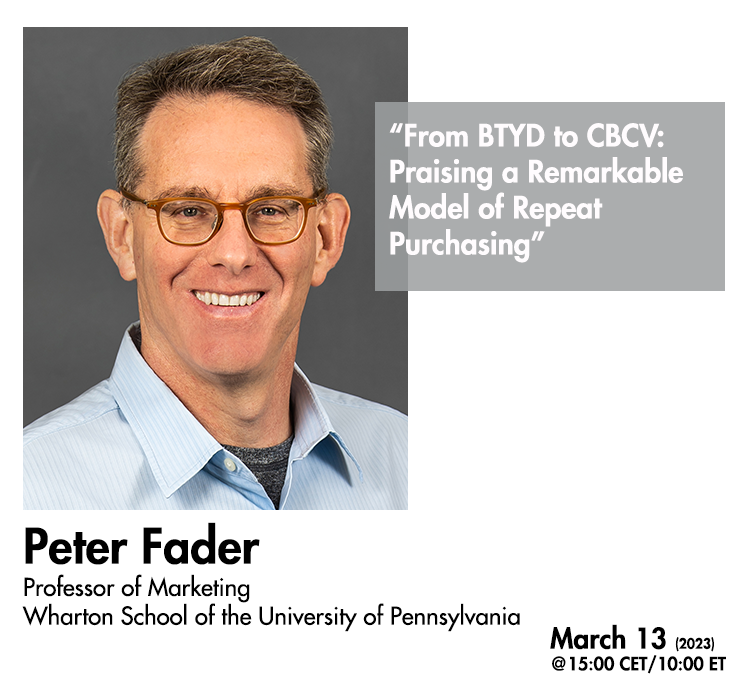
Speaker: Peter Fader, The Wharton School of the University of Pennsylvania
Date/time: March 13, 2023 @15:00 CET/10:00 ET. Register ►here
Title: From BTYD to CBCV: Praising a Remarkable Model of Repeat Purchasing
Abstract
Professor Fader will give a “behind the scenes” discussion of his primary research activities (and his broader professional trajectory) over the past 20 years. He will talk candidly about key influences on his work and the remarkable collaborations he has enjoyed and benefitted from. The talk will touch on a wide array of applications and will draw analogies to other research domains that continue to inspire his thinking and his ongoing activities.
About the speaker
Peter Fader is the Frances and Pei-Yuan Chia Professor of Marketing at The Wharton School of the University of Pennsylvania. His expertise centers around the analysis of behavioral data to understand and forecast customer shopping/purchasing activities. He works with firms from a wide range of industries. Managerial applications focus on topics such as customer relationship management, lifetime value of the customer, and sales forecasting for new products. Professor Fader co-founded a predictive analytics firm (Zodiac) in 2015, which was sold to Nike in 2018. He then co-founded (and continues to run) Theta to commercialize his more recent work on “customer-based corporate valuation.”
Fader is the author of three books: “Customer Centricity: Focus on the Right Customers for Strategic Advantage” (2020), “The Customer Centricity Playbook” with Sarah Toms (2018), and “The Customer-Base Audit” with Bruce Hardie and Michael Ross (2022).
He has won many awards for his research and teaching accomplishments. Among these achievements, he was named by Advertising Age as one of its inaugural “25 Marketing Technology Trailblazers” in 2017 (and was the only academic on the list).
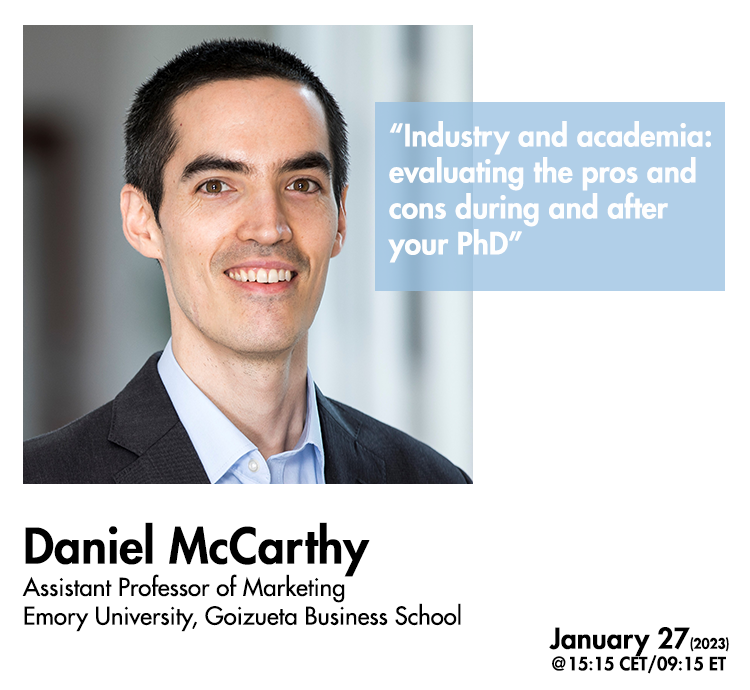
Speaker: Daniel McCarthy, Emory University, Goizueta Business School
Date/time: January 27, 2023 @15:15 CET/09:15 ET. Register ►here
Title: Industry and academia: evaluating the pros and cons during and after your PhD.
Downloads:
Slides
Session recording
Abstract
As PhD students in a business school, your work naturally has implications for industry. After completing your PhD, you may be thinking about positions in industry, as well as options in academia (or some sort of combination of the two). As such, thinking pragmatically about applicability of research to industry is valuable both during and after your doctoral studies, but comes with tradeoffs. In this session, we will discuss these tradeoffs to help you understand what balance may be best for you.
About the speaker
Daniel McCarthy is an Assistant Professor of Marketing at Emory University's Goizueta School of Business. His research specialty is the application of leading-edge statistical methodology to contemporary empirical marketing problems. His research has been accepted and published in top-tier academic journals such as the Journal of Marketing Research, Marketing Science, Journal of Marketing, among others. It has also been featured in media outlets such as the Harvard Business Review, Wall Street Journal, FT, Fortune, The Economist, Inc, USA Today, among others. He is the co-founder of Zodiac and Theta Equity Partners.
Fall 2022
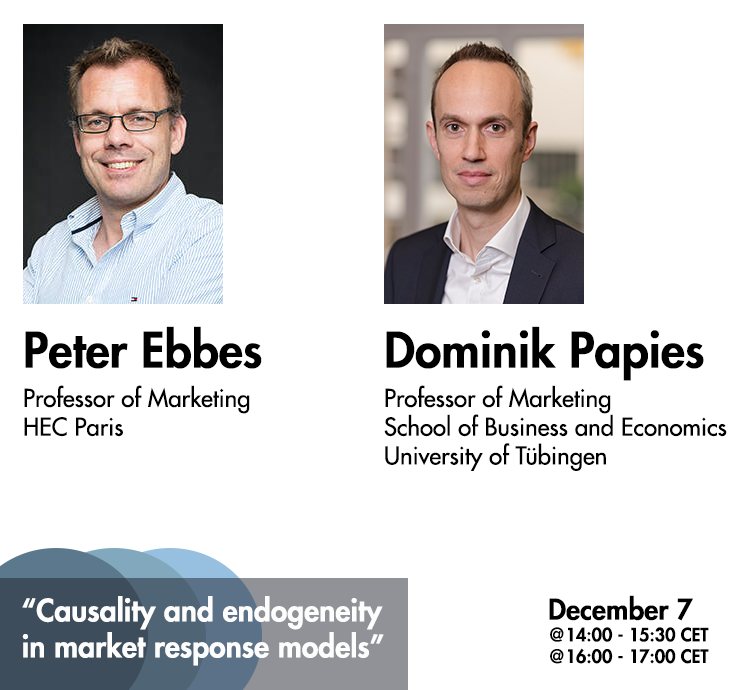
Topic: Causality and endogeneity in market response models: an applied workshop on best practices and new developments.
Date/time: December 7
Part 1: 14:00-15:30 CET
Part 2: 16:00-17:00 CET
►Register (Zoom)
For simplicity, we use one Zoom room for both parts (more details below). Please feel free to join any or both of them, whichever suits you best.
Abstract
Many marketing researchers that use non-experimental data are struggling with the proper identification of causal effects of independent variables (e.g., management decisions) on dependent variables (e.g., demand, firm performance). The reason is that the identification of a causal effect depends on the untestable assumption that the error term of a model is uncorrelated with the independent variables. If this assumption is not met, the independent variable(s) may be endogenous and the parameter estimates are potentially biased.
The topic of identification of causal effects and endogeneity has received considerable attention in marketing (as well as in other disciplines). It is probably one of the most frequently encountered challenge in a review process at an academic journal in marketing for researchers using observational (archival) data.
Against this background, part 1 of the workshop will familiarize participants with the problem of endogeneity and potential remedies. It will cover the opportunities and challenges associated with traditional approaches (e.g., Instrumental Variable estimation). Part 2 of the workshop will cover more recent developments in addressing endogeneity (e.g., Gaussian Copulas). Furthermore, the workshop will cover how the data structure (e.g., panel data) can be utilized to address the problem of endogeneity.
This workshop aims at providing a hands-on, non-technical, approach to this topic. This workshop is particularly intended for applied researchers in marketing, particularly PhD students or early-career faculty.
The workshop will heavily draw from the following chapters: Papies, Ebbes, Van Heerde (2017), Ebbes, Papies, Van Heerde (2017), and Papies, Ebbes, Feit (2022).
About the speakers
Peter Ebbes is a Professor of Marketing at HEC Paris. His research focuses on understanding aspects of consumer behavior using novel statistical methods to accommodate the increasing complexity of the consumer marketplace and the growing richness of available data sources. Insights from his studies help to improve marketing decision making, particularly concerning segmentation, targeting, and pricing activities. Peter's work has been published in Marketing Science, Management Science, Journal of Marketing Research, Journal of Marketing, and other journals. His teaching interests include marketing research and analytics, marketing models, and business analytics.
Dominik Papies is a Professor of Marketing at the School of Business and Economics at the University of Tübingen in Germany. His substantive research interests focus on how digitization and new technology affect markets and business models. In the methodological domain, Dominik studies the boundaries of established and the potential of new methods of causal identification and addressing endogeneity in market response models. His research has been published in the top-tier journals of the field (e.g., Journal of Marketing, Journal of Marketing Research, Marketing Science, International Journal of Research in Marketing, Journal of the Academy of Marketing Science; Information Systems Research). His work has been funded, among other, by the German Research Foundation (DFG) and the Marketing Science Institute.
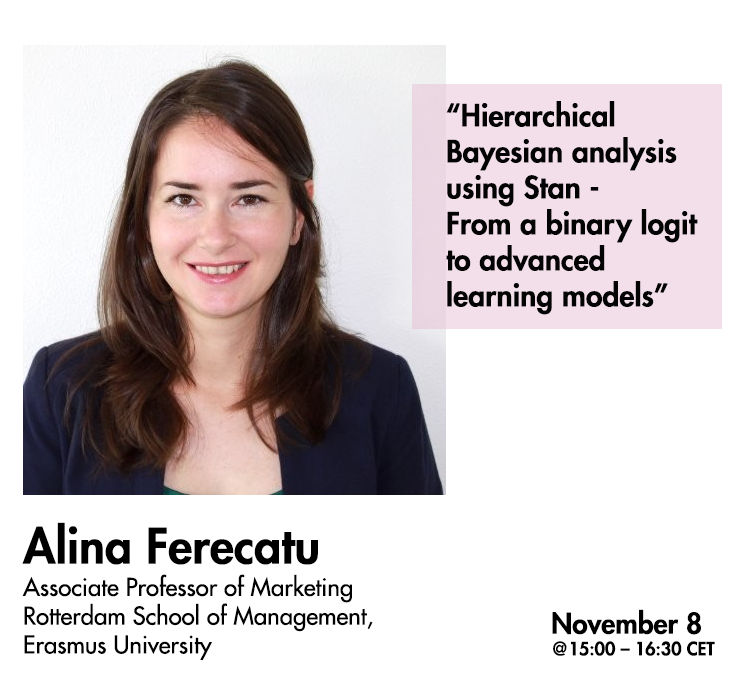
Date/time: November 8, 15:00-16:30 CET. ►Register (Zoom)
Topic: Hierarchical Bayesian analysis using Stan - From a binary logit to advanced learning models
Link to materials
Recording
Abstract
The presentation will walk you through how to iteratively develop and estimate a model using stan. The decision problem I will focus on is a behavioral task in which subjects learn the best outcome in experimental games. To illustrate the task, I will play a game involving a multiarmed bandit problem. To model players’ behavior, I will start with a binary logit model, build it to a hierarchical model, and then introduce a quantal response specification which allows us to model players’ learning patterns. As a last step, I will build a customized likelihood function to assess decision makers’ learning behavior and other relevant behavioral patterns.
About the speaker
Alina Ferecatu is an Associate Professor of Marketing at the Rotterdam School of Management, Erasmus University. Her research interests lie at the intersection between behavioral decision making and marketing research. Her work focuses on understanding managerial learning, adapting website design to match consumers’ information preferences, coordination in market feedback systems, and how categorization shapes prospect theory.
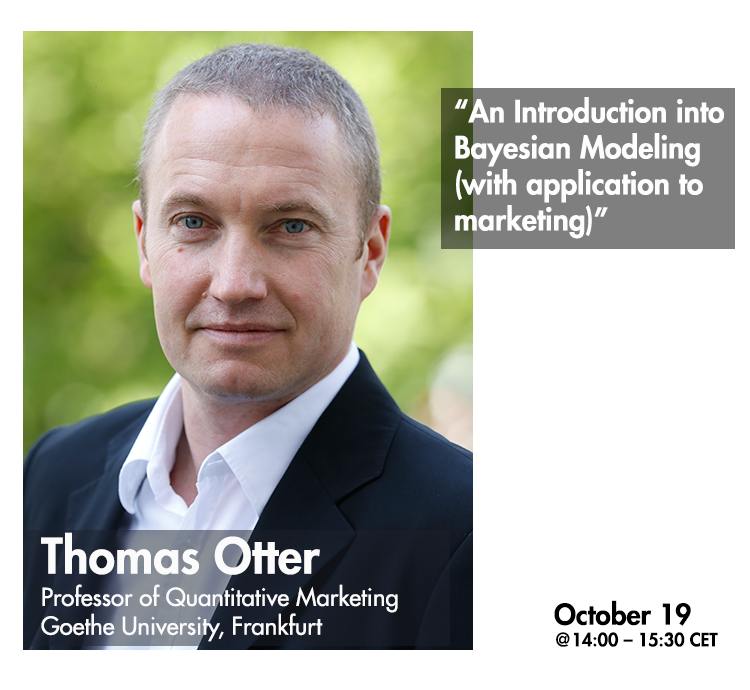
Date/time: October 19, 14:00-15:30 CET. ►Register (Zoom)
Topic: An Introduction into Bayesian Modeling (with application to marketing)
Download presentation
PlayWBinomialProbit.R
StanProbit.stan
Abstract
Over the past 40 years Bayesian inference has gained popularity in applied disciplines like marketing. I discuss the advantages of the Bayesian perspective and the reasons for its adoption in applied fields. I will give hands on examples using R and the packages bayesm and RStan and showcase some recent, novel applications.
About the speaker
Thomas Otter is professor of quantitative marketing at Goethe University Frankfurt. His research focuses on Bayesian modeling with application to marketing. He uses Bayesian statistics and MCMC techniques to develop and refine quantitative marketing models by incorporating psychological and economic theory. He currently serves as VP membership & communication for EMAC and coordinating co-editor for Quantitative Marketing and Economics.
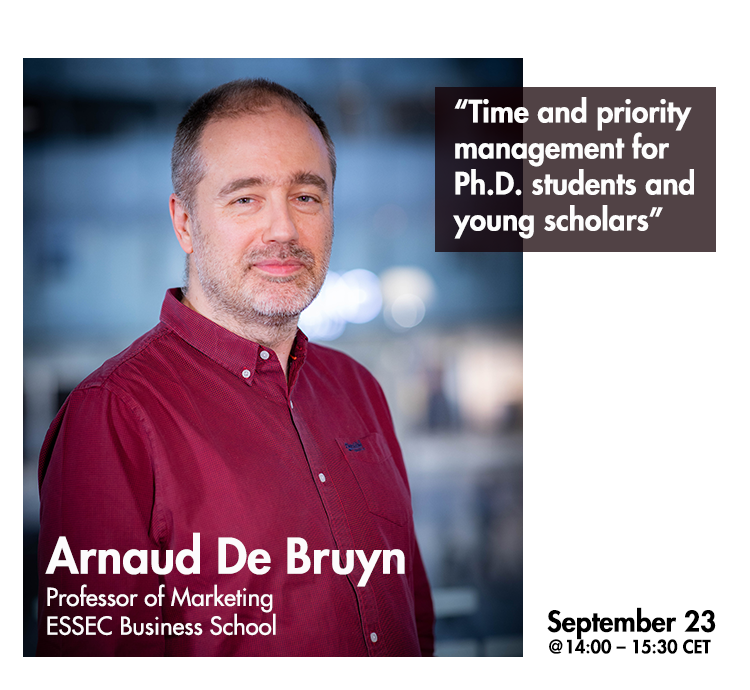
Date/time: September 23, 14:00 – 15:30 CET. ►Register (Zoom)
Topic: Time and priority management for Ph.D. students and young scholars.
Abstract
Some graduate students and young faculty struggle while others strive. Why is that? While research productivity can be immensely improved through education and skills or a more conducive research environment, we have found that work habits are the most important yet most under-discussed factors to explain the immense variance observed in real life. In our talk, and using personal examples of (abundant) failures and (rarer) successes, we will focus on two specific aspects of these habits: setting priorities and consistently achieving a state of “deep work.”
About the speaker
Arnaud De Bruyn is a Professor of Marketing and Associate Dean for the Ph.D. Program at ESSEC Business School, Distinguished Visiting Research Scholar at the Institute for the Study of Business Markets (Penn State University), Founder of DECISIVE SYSTEM (a European fundraising analytics company), and Principal at DecisionPro inc. (a U.S.-based marketing analytics software company). He is passionate about marketing analytics, especially as it applies to fundraising analytics, marketing engineering, and artificial intelligence. His work has been published in Journal of Marketing Research, Marketing Science, Management Science, Information Systems Research, International Journal of Research in Marketing (best paper award, Jan-Benedict Steenkamp Award for Long-Term Impact, and Emerald citation excellence award), and a few others.
